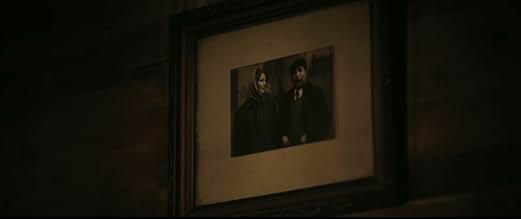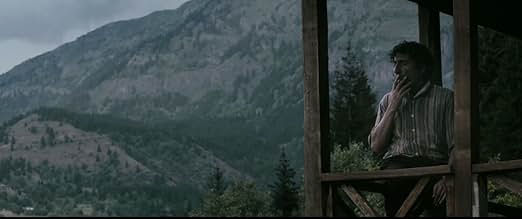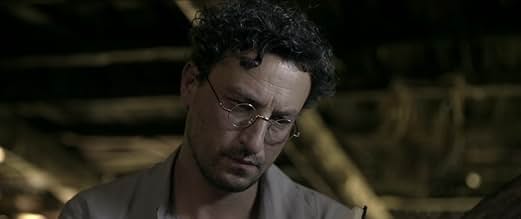Rüzgârin Hatiralari
- 2015
- 2h 4min
PUNTUACIÓN EN IMDb
7,0/10
1,9 mil
TU PUNTUACIÓN
Aborda las cuestiones de etnia y pertenencia y transmite lo que se siente al cruzar las fronteras, no sólo en términos de dislocación fuera de los límites de un país, sino también la lucha p... Leer todoAborda las cuestiones de etnia y pertenencia y transmite lo que se siente al cruzar las fronteras, no sólo en términos de dislocación fuera de los límites de un país, sino también la lucha por existir en los márgenes de una sociedad.Aborda las cuestiones de etnia y pertenencia y transmite lo que se siente al cruzar las fronteras, no sólo en términos de dislocación fuera de los límites de un país, sino también la lucha por existir en los márgenes de una sociedad.
- Premios
- 4 premios y 13 nominaciones en total
Argumento
Reseña destacada
MEMORIES OF THE WIND (Rüzgâın Hatıraları) Written and directed by Öscan Alper, starring Onur Saylak and Sofya Khandamirova. image1.jpeg Film poster is a panorama of haunting faces in a haunting Turkish film
Shown in the Coup de Coeur (From the heart) sectıon out of competition, but nevertheless one of the Big films of the festival, this is an extended poetic meditation on the 1915 Genocide of the Armenians in Turkey. In a way a followup to Faith Akin's 1914 "The Cut" but even more politically daring in that it was made by a Turk resident in Turkey, rather than an oversees Turk in Germany. Significantly it is now beginning to look like mentioning the Armenian Genocide in Turkey is no longer quite the absolute government sanctioned taboo and violation of Turkish law it has been until now. The hero of Mr. Alper's film is ARAM an Armenian artist living in Istanbul in 1943 at the height of World War II. Although Turkey is nominally neutral in the war the government definitely favors Hitler. The film opens in his studio where a beautiful young woman is posing for him in the nude. When she leaves he visits the office of an Armenian friend who is the publisher of an opposition magazine. He has recently published an article discussing Turkish collusion with Nazi Germany. The publication building is raided by a government backed mob out to lynch "the Dirty Communists".
Aram barely escapes and takes refuge momentarily in a cinema where news footage is being shown of Hitlers military triumphs in Europe. His friend arrives and advises him that it is no longer safe for him to remain in Turkey with the implication that a second Armenian genocide may be in the making. The rest of the film traces Aram's escape route all the way across Turkey to the Soviet Georgian border which is closed and heavily guarded. For the bulk of the film, Aram the city intellectual, is forced to hide out in a remote log house inhabited by a Gruff Russian speaking older man, bearded Mikhail, and a pretty young Russian girl, Meryam, from Sotchi across the border, until the spring thaw when there will be a possibility of slipping over the border to safety. The relationship between the older man Mikhail and young Merjem is not completely clear but she seems to be more of an unwilling servant than a devoted spouse.
Isolated in a magnificent mountain landscape and a primitive forest, taken in as a temporary guest by this primitive living couple, Aram continues to make sketches and write poetry in his room upstairs, as he despairs more and more of ever escaping. In a series of carefully inserted flashbacks -- the memories of the titular wind - we see that his entire family was wiped out in the 1915 massacres and he alone, a youngster, perhaps a teenager at the time, escaped by walking over an endless flat plain as if in a surreal Di Chirico landscape. The bulk of the film takes place in the rugged cabin and glorious rain swept landscape with very little dialogue and slow visual revelation of the gradual attraction between the girl, Meryem, and Aram which culminates in their physical union when Mikhail, the master of the house is away on a trip for several days.
This will lead to severe complications and another desperate flight, this time Aram and the girl who has had enough of this rugged life with roughhewn older Mikhail, when Turkish soldiers raid the house having been advised of the runaway Armenian's presence by a treacherous village informant. The ensuing chase will end on a small wooden boat with the new lovers trying to elude Turkish soldiers shooting at them from the shore. Did they make it? -- or were they struck down by the firing from the shore? -- Hard to say as the films goes very into very slow whiteout ... to soft plaintiff music which, sparingly used, is another poetic aspect of this long slow meditation on the Armenian genocide perpetrated in Turkey in 1915 just a hundred year ago --and its lingering effects thirty years later. Haunting from beginning to end.
Shown in the Coup de Coeur (From the heart) sectıon out of competition, but nevertheless one of the Big films of the festival, this is an extended poetic meditation on the 1915 Genocide of the Armenians in Turkey. In a way a followup to Faith Akin's 1914 "The Cut" but even more politically daring in that it was made by a Turk resident in Turkey, rather than an oversees Turk in Germany. Significantly it is now beginning to look like mentioning the Armenian Genocide in Turkey is no longer quite the absolute government sanctioned taboo and violation of Turkish law it has been until now. The hero of Mr. Alper's film is ARAM an Armenian artist living in Istanbul in 1943 at the height of World War II. Although Turkey is nominally neutral in the war the government definitely favors Hitler. The film opens in his studio where a beautiful young woman is posing for him in the nude. When she leaves he visits the office of an Armenian friend who is the publisher of an opposition magazine. He has recently published an article discussing Turkish collusion with Nazi Germany. The publication building is raided by a government backed mob out to lynch "the Dirty Communists".
Aram barely escapes and takes refuge momentarily in a cinema where news footage is being shown of Hitlers military triumphs in Europe. His friend arrives and advises him that it is no longer safe for him to remain in Turkey with the implication that a second Armenian genocide may be in the making. The rest of the film traces Aram's escape route all the way across Turkey to the Soviet Georgian border which is closed and heavily guarded. For the bulk of the film, Aram the city intellectual, is forced to hide out in a remote log house inhabited by a Gruff Russian speaking older man, bearded Mikhail, and a pretty young Russian girl, Meryam, from Sotchi across the border, until the spring thaw when there will be a possibility of slipping over the border to safety. The relationship between the older man Mikhail and young Merjem is not completely clear but she seems to be more of an unwilling servant than a devoted spouse.
Isolated in a magnificent mountain landscape and a primitive forest, taken in as a temporary guest by this primitive living couple, Aram continues to make sketches and write poetry in his room upstairs, as he despairs more and more of ever escaping. In a series of carefully inserted flashbacks -- the memories of the titular wind - we see that his entire family was wiped out in the 1915 massacres and he alone, a youngster, perhaps a teenager at the time, escaped by walking over an endless flat plain as if in a surreal Di Chirico landscape. The bulk of the film takes place in the rugged cabin and glorious rain swept landscape with very little dialogue and slow visual revelation of the gradual attraction between the girl, Meryem, and Aram which culminates in their physical union when Mikhail, the master of the house is away on a trip for several days.
This will lead to severe complications and another desperate flight, this time Aram and the girl who has had enough of this rugged life with roughhewn older Mikhail, when Turkish soldiers raid the house having been advised of the runaway Armenian's presence by a treacherous village informant. The ensuing chase will end on a small wooden boat with the new lovers trying to elude Turkish soldiers shooting at them from the shore. Did they make it? -- or were they struck down by the firing from the shore? -- Hard to say as the films goes very into very slow whiteout ... to soft plaintiff music which, sparingly used, is another poetic aspect of this long slow meditation on the Armenian genocide perpetrated in Turkey in 1915 just a hundred year ago --and its lingering effects thirty years later. Haunting from beginning to end.
- barev-85094
- 13 dic 2015
- Enlace permanente
Selecciones populares
Inicia sesión para calificar y añadir a tu lista para recibir recomendaciones personalizadas
- How long is Memories of the Wind?Con tecnología de Alexa
Detalles
Taquilla
- Recaudación en todo el mundo
- 103.975 US$
- Duración2 horas 4 minutos
- Color
Contribuir a esta página
Sugerir un cambio o añadir el contenido que falta

Principal laguna de datos
By what name was Rüzgârin Hatiralari (2015) officially released in Canada in English?
Responde











